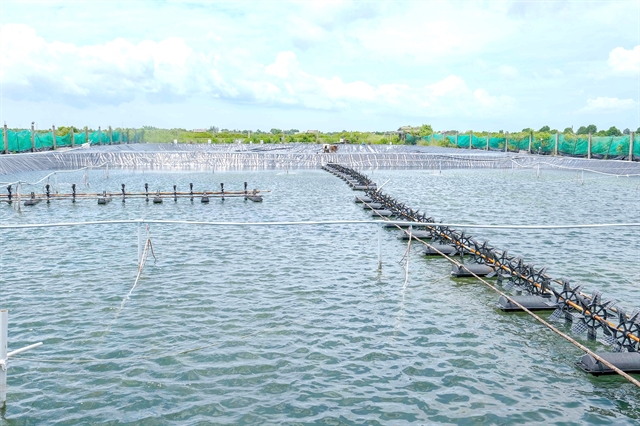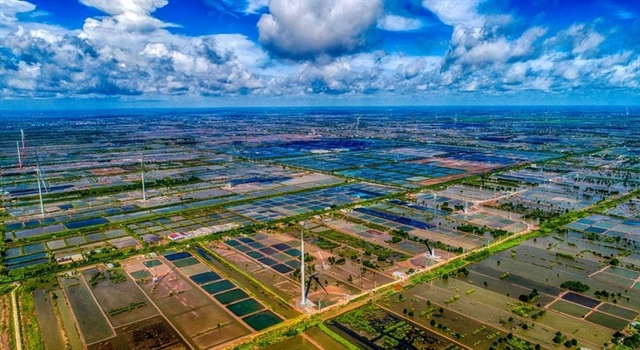 Society
Society


|
| A solar-powered shrimp farming model implemented by Trịnh Văn Hoặc in Bình Điền Hamlet, Long Điền Tây Commune. — VNA/VNS Photo Thanh Liêm |
BẠC LIÊU — The use of renewable energy in agriculture is opening up new directions for the fisheries industry in the Cửu Long (Mekong) Delta provinces, especially as climate change becomes increasingly challenging, causing notable damage to the agricultural sector.
In Bạc Liêu Province, the combination of solar energy with shrimp farming not only helps reduce costs and CO2 emissions, but also plays a crucial role in adapting to the challenges of climate change.
The province now has about 44 organisations and individuals investing in installing solar energy systems combined with shrimp farming on an area of 70 hectares.
The use of solar energy in shrimp farming has brought benefits such as proactive electricity sourcing, reduced electricity costs, and decreased greenhouse gas emissions, contributing to Việt Nam's commitment to reducing CO2 emissions by 2030.
Trịnh Văn Hoặc, living in Bình Điền hamlet, Long Điền Tây Commune, is one of the households applying the solar power model combined with shrimp farming in Đông Hải District.
His family owns 20,000 square metres of land, including 3,000 square metres for aquaculture, and the remaining area is used for water storage.
According to Hoặc, in the years before having solar power, electricity costs for family activities and aquaculture operation were very high, averaging around VNĐ7 million (US$286) per month, sometimes even exceeding VNĐ10 million during peak periods.
In the last two years since installing solar power, he has been very pleased with the benefits this model brings.
Due to the sunny conditions, the electricity production is consistently high and with surplus for use.
His electricity costs have been significantly reduced, and during peak production seasons, he only has to pay around VNĐ7 million per month, or even less than VNĐ3 million in months with lower production.
However, the initial investment cost of this model is high, he said.
He was fortunate to receive 70 per cent support for the installation of the solar power system from the Bread for the World, a non-partisan Christian advocacy organisation based in the United States, so his family only had to pay about VNĐ21 million for this system.
The project "Energy conversion and climate change adaptation in the Mekong Delta region" has been implemented from 2021-23 in four communes of Đông Hải District, aiming for the efficient use of energy, closely linked to the application of the low-emission biogas renewable energy model in shrimp farming processes.
Nguyễn Thị Hạt's family in Bửu 2 hamlet, Long Điền Đông Commune, is one of the households that has been supported by the project to install a biogas model.
Recognising the advantages of the model, she has actively participated in the "Clean Energy" group and conducted various advisory and support activities for local residents to learn and experiment with the model.
Hạt said the unpredictable weather due to climate change in recent years has significantly affected the growth of shrimp and created considerable challenges impacting the health and lives of women, a group that is gradually increasing in the aquaculture sector.
The biogas model has brought positive outcomes to her life and her family. Each month, she can significantly save on gas and electricity costs, Hạt said, adding that she no longer spends much time finding coal and firewood for cooking, allowing her to take better care of herself and her family.
According to Nguyễn Trung Hiếu, deputy director of the provincial Department of Agriculture and Rural Development, most shrimp farming households currently use electricity for both domestic and production purposes in shrimp farming, leading to a significant electricity consumption, and annual increases in electricity prices result in high production costs, about 7-10 per cent of production costs depending on the type of farming.
Meanwhile, the Mekong Delta region has significant potential for the development of solar energy as a supplementary source to reduce costs, decrease dependence on the grid, and increase income from selling surplus electricity to the grid.

|
| Wind farm in Bạc Liêu Province. |
Reports from households with installed solar power systems show that they can reduce the electricity consumption from the national grid for shrimp farming households by 40-50 per cent monthly.
"The use of solar power is a criterion for Aquaculture Stewardship Council (ASC) certification and Best Aquaculture Practices (BAP) certification. Customers highly appreciate products that show concern for the use of renewable energy and environmental protection," Hiếu said.
Challenges in green energy development
Despite initial benefits, the development of shrimp farming models combined with renewable energy is facing various challenges and has not realised its full potential.
According to Hiếu, the government has not yet implemented policies to encourage the combination of shrimp farming and solar energy.
Some solar power projects combined with shrimp farming have not done well in planning and initial design, focusing only on the solar energy part in the initial construction phase. This has resulted in shrimp farming activities not achieving optimal efficiency.
The relatively large initial investment is also a difficulty for small-scale shrimp farming households, and the loan procedures at banks often require collateral, making it challenging to access.
Hiếu said, the agriculture sector in Bạc Liêu proposes that using renewable energy in shrimp farming in the Mekong Delta is a correct direction, creating conditions for environmentally friendly shrimp farming. The use of renewable energy contributes to ensuring shrimp products meet export standards, bringing economic benefits to people, businesses and the country.
The agriculture sector hopes the government will consider policies to encourage such models.
He added that clearer guidance on procedures is needed for all shrimp farmers to access and invest.
Especially, the installation of solar power systems combined with shrimp farming needs regional planning, synchronised design, and implementation to avoid deployment difficulties.
Associate Professor, Dr Lê Anh Tuấn, advisor to the Research Institute for Climate Change in the Mekong Delta under Cần Thơ University, said the Mekong Delta is the largest agricultural production area in the country and has great potential for developing renewable energy, particularly solar and wind energy.
To overcome existing limitations in renewable energy development, he suggested that the government needs suitable support policies, focusing on addressing issues to reduce the initial investment cost of renewable energy systems. Businesses should invest in researching and developing new technologies to reduce costs and improve the efficiency of renewable energy use.
Farmers, as both beneficiaries and operators of these models, need training in basic technical skills for installing and maintaining systems.
Tuấn also proposed that policy planners should focus on specific solutions for each agricultural production sector.
In shrimp farming, there should be mechanisms to popularise the use of renewable energy to run fans supplying oxygen to water, operate water quality monitoring devices, and process shrimp feed.
Similarly, in crop farming, there is a need to promote applications such as automatic irrigation and drying of agricultural products. — VNS